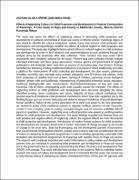| dc.description.abstract | ACHOM OLUKA IRENE (2006-M033-10019)
Effects of Neglecting Culture in Child Protection and Development in Pastoral Communities
of Karamoja: A Case Study of Rupa Sub-County in Matheniko County, Moroto District
Karamoja Region
The study was about the effects of neglecting culture in promoting child protection and
development in pastoral communities in Rupa sub-county in Moroto district -Karamoja region. It
was meant to identify the cultural institutions, values, norms that enhance child protection and
development and correspondingly establish the effects of cultural neglect in child protection and
development. The study also highlights factors which influence cultural neglect in child protection
and development in order to find solutions and recommendations to such problems through the
analysis done by the researcher after data collection. Three hundred and sixty seven (367)
respondents were randomly selected for the study. Primary data were collected through indepth
informant interviews and focus group discussions. Various agency and government of Uganda
publications and textbooks were used then as sources of secondary data. The research findings
identified the following existing traditional institutions and practices which traditionally provided
a platform for enhancement of child protection and development: the clan system, adolescent
sexuality, courtship rape, marriage using animals, polygamy, care of orphans and widows, child
birth, protection of children from evil or harm, naming of children, ownership of non-biological
children, gender roles and livelihoods, mainstreaming of pastoralist protection issues, education,
traditional healing/health care, nomenclature, disarmament/restoration of law and order in
Karamoja, role of elders, congregating under trees (usually outside the manyata). The effects of
neglecting culture in child protection and development were discussed alongside the above
identified existing norms, institutions and values. Majority of these cultural institutions hold
positive aspects of traditional child protection mechanisms which have been neglected due to the
limiting factors such as: chronic insecurity and violence, rampant incidences of sexual abuse/rape,
human sacrifices, failure of the current generation set to hand over power to the next generation
set, decline in power of the traditional systems to regulate conflicts, poverty, chronic insecurity,
women‟s role in raiding, pride in raiding, extended drought, lack of economic activities, loss of
parents or guardians. However, neglecting some cultural practices was viewed as yielding positive
effects for child protection and development. The study findings revealed that whereas there are
both positive and negative effects of neglecting culture, the negative effects are more detrimental
to child protection and development. Introduction of modern formal systems for child protection
and development are not given ample time to evolve. Advocates of change are eager to see results
of change in the short term. Both the Karimojong and the development partners (Government,
Non-Governmental Organisations (NGOs), private sector) need to take into consideration the role
of culture in designing development programmes in order to develop appropriate sustainable child
protection and development programmes for Karamoja with specific focus on Rupa sub-county.
The research will contribute important and useful information to policy makers and development
partners who are interested in promoting child protection and development in Rupa sub-county
and to the government that is currently implementing the Peace, Recovery and Development Plan
(PRDP) in Karamoja. This study will also help scholars in the academic field to undertake further
research into issues of culture and development and it is important that this study was carried out
to help Moroto district in designing its District Development Plans. NGOs and UN agencies will
be able to evaluate the relevance and the effectiveness of their programme interventions using the
recommendations of this research.
Keywords: Pastoral Communities, Child Protection, Karamoja | en_US |


